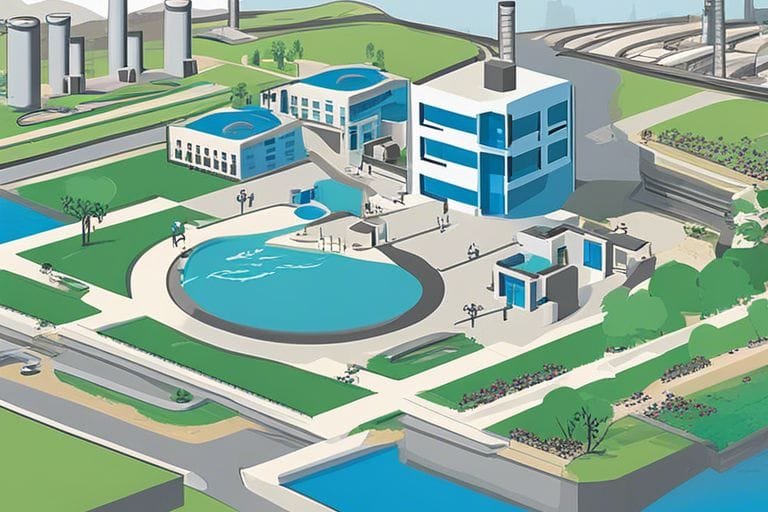
WASA
Karachi
Check Karachi water and
sewerage bill here

WASA
Lahore
Check Lahore water and
sewerage bill here

WASA
Faisalabad
Check Faisalabad water and
sewerage bill here

WASA
Rawalpindi
Check Rawalpindi water and
sewerage bill here

WASA
Peshawar
Check Peshawar water and
sewerage bill here

WASA
Hyderabad
Check Hyderabad water and
sewerage bill here
All About WASA – Your Guide to Pakistan’s Water and Sewerage Authorities
WASA, or Water and Sewerage Authorities, are independent bodies responsible for water supply and wastewater management across various Pakistani cities. Understanding their history, reach, and operations can provide valuable insights into the state of water and sanitation in the country. This comprehensive overview aims to shed light on the origins, growth, services, challenges, and initiatives of these crucial entities.
Origins and Growth – The concept of dedicated water and sanitation authorities emerged in the 1970s to address Pakistan’s growing urban water needs. The first WASA was established in Karachi in 1973, followed by Lahore and several other major cities. Over time, WASAs were formed in cities including Islamabad, Peshawar, Rawalpindi, Faisalabad, Multan, Gujranwala, Hyderabad, Sukkur, and Quetta.
City Coverage and Services – Each WASA operates within its designated city boundaries, providing crucial services such as water treatment and distribution, sewerage collection and treatment, stormwater drainage, and maintenance of water and sewer infrastructure. They also focus on customer service and grievance redressal to ensure the smooth functioning of their operations.
Challenges and Initiatives – WASAs face various challenges, including aging infrastructure, water scarcity and pollution, high operation and maintenance costs, and financial constraints. To address these challenges, they implement initiatives such as infrastructure upgrade and rehabilitation projects, water conservation campaigns, adoption of new technologies, public-private partnerships, and improved financial management.
Additional Information – Each WASA has its own website and contact details for specific information and grievance redressal. The Ministry of Housing and Works oversees the overall functioning of WASAs across Pakistan, and the National Water Commission provides policy guidance and technical support to WASAs.
Further Exploration – Individuals can explore individual WASA websites for detailed information on their specific services, projects, and contact details. Resources like annual reports and official publications can offer deeper insights into their operations and challenges. Understanding the crucial role that WASA plays in ensuring public health and sanitation in Pakistani cities is essential for fostering greater appreciation for their services and encouraging water conservation practices.
Origins and Growth
Before delving into the current state of Water and Sewerage Authorities (WASAs) in Pakistan, it’s essential to understand their origins and growth over the years. The journey of WASAs in Pakistan began in the 1970s, and their evolution is significant in addressing the burgeoning water and sanitation needs of urban areas.
Concept of dedicated water and sanitation authorities in the 1970s
Authorities in Pakistan recognized the pressing need for organized and efficient management of water supply and wastewater services in urban centers. As a result, the concept of dedicated water and sanitation authorities was conceived in the 1970s to centralize and streamline these critical services.
Establishment of the first WASA in Karachi and subsequent formation in other major cities
One of the milestone achievements in the history of WASAs was the establishment of the first WASA in Karachi in 1973. Following this groundbreaking initiative, other major cities in Pakistan also witnessed the formation of their respective WASAs to address the escalating water and sanitation needs of their growing populations.
City coverage and services provided by different WASAs
Water and Sewerage Authorities operate within specific city boundaries, catering to the diverse water-related needs of residential, commercial, and industrial areas. Their range of services typically includes water treatment and distribution, sewerage collection and treatment, stormwater drainage, as well as the maintenance and repair of water and sewer infrastructure.
It is crucial to recognize that WASAs play a vital role in ensuring public health and sanitation in their respective cities. Their services are indispensable for sustaining urban life and fostering a healthy, hygienic environment for the residents. Additionally, WASAs undertake customer service and grievance redressal to address any concerns related to water and sanitation services.
Challenges and Initiatives
Obviously, operating as independent bodies, Water and Sewerage Authorities (WASAs) face several challenges in fulfilling their responsibilities. These include aging infrastructure, water scarcity and pollution, high operation and maintenance costs, and financial constraints. However, to address these challenges, WASAs have also implemented various initiatives, such as infrastructure upgrade and rehabilitation projects, water conservation campaigns, adoption of new technologies like desalination and rainwater harvesting, public-private partnerships, and improved financial management and revenue generation.
Various challenges faced by WASAs including aging infrastructure and financial constraints
Obviously, WASAs encounter various challenges in the course of their operations. One such challenge is the aging infrastructure, which requires continuous maintenance and upgrade to ensure efficient water supply and wastewater management. Moreover, financial constraints often hinder the implementation of necessary projects and initiatives, impacting the overall performance of WASAs.
Initiatives implemented by WASAs to address challenges such as infrastructure upgrade and water conservation campaigns
Water and Sewerage Authorities (WASAs) have proactively implemented initiatives to address the challenges they face. For instance, they have focused on infrastructure upgrade and rehabilitation projects to enhance the efficiency and reliability of water and sewer systems. Additionally, water conservation campaigns have been launched to promote responsible water usage and minimize wastage, contributing to sustainable resource management.
Implemented initiatives by WASAs demonstrate their commitment to improving water supply and sanitation services, while addressing crucial challenges such as aging infrastructure and water scarcity. These initiatives include infrastructure upgrade and rehabilitation projects, water conservation campaigns, adoption of new technologies, public-private partnerships, and improved financial management.

Additional Information
Now, let’s delve into some additional information that can further enhance your understanding of WASAs in Pakistan.
Availability of specific information and grievance redressal on individual WASA websites
Availability of specific information and channels for grievance redressal can be found on individual WASA websites. These platforms offer detailed insights into the specific services, projects, and contact details for each city’s water and sewerage authority. In addition, they provide avenues for lodging complaints and seeking resolutions for any issues related to water supply and sanitation services.
Oversight and support from the Ministry of Housing and Works and National Water Commission
Commissioned by the Ministry of Housing and Works and supported by the National Water Commission, WASAs receive crucial oversight and guidance. The Ministry of Housing and Works plays a pivotal role in overseeing the overall functioning of WASAs across Pakistan, while the National Water Commission provides policy guidance and technical support to these authorities.
Information about the oversight and support provided by the Ministry of Housing and Works and the National Water Commission can shed light on the broader governance and regulatory framework that WASAs operate within. This insight is essential for understanding the institutional structures that influence their operations and decision-making processes.
Further Exploration
To delve deeper into the world of Water and Sewerage Authorities (WASA) in Pakistan, there are various avenues for further exploration. From uncovering specific details about individual WASA operations to gaining insights into their challenges and initiatives, the following subsections provide guidance and encouragement for a comprehensive understanding of WASAs.
Guidance on exploring individual WASA websites and resources for deeper insights
Insights into the specific services, projects, and contact details of each WASA can be found by visiting their respective official websites. These platforms often provide detailed information on ongoing initiatives, water supply and wastewater management projects, and infrastructure development. Additionally, resources such as annual reports and official publications can offer a deeper understanding of the operations and challenges faced by each WASA.
Encouragement for greater appreciation and understanding of the crucial role of WASA
One of the first steps towards fostering a greater appreciation for the services provided by WASAs is to understand the crucial role they play in ensuring public health and sanitation in Pakistani cities. By recognizing the efforts of WASAs and embracing water conservation practices, individuals can actively contribute to the sustainability of water resources and the improvement of urban living conditions.
Plus, understanding the specific challenges and initiatives of WASAs can lead to a greater awareness of the efforts being made to address issues such as aging infrastructure, water scarcity, and financial constraints, ultimately contributing to the positive development of water and sanitation systems in Pakistan.
Conclusion – Your Guide to Pakistan’s Water and Sewerage Authorities
Ultimately, delving into the world of WASAs in Pakistan provides a comprehensive understanding of the crucial role they play in ensuring public health and sanitation in urban areas. The origins and growth of these authorities in the 1970s marked a significant milestone in addressing the growing water and wastewater management needs of Pakistani cities. With the establishment of dedicated WASAs in major urban centers, including Karachi, Lahore, and Islamabad, these authorities have been at the forefront of providing essential services such as water treatment, sewerage collection and treatment, and stormwater drainage.
Challenges such as aging infrastructure, water scarcity, and financial constraints have not deterred WASAs from implementing various initiatives to improve their operations. From infrastructure upgrade projects to water conservation campaigns and adoption of new technologies, WASAs are continuously working towards addressing these challenges and ensuring sustainable water and sanitation services. The Ministry of Housing and Works and the National Water Commission play crucial roles in overseeing and supporting the overall functioning of WASAs across Pakistan.
For those interested in further exploring the world of WASAs, individual websites and official publications can provide detailed information about specific services, projects, and contact details. Understanding the background and efforts of WASAs can foster greater appreciation for their services and encourage water conservation practices in Pakistani cities, ultimately contributing to the well-being of communities and the environment.
FAQ – Delving into WASA – Your Guide to Pakistan’s Water and Sewerage Authorities
Q: What is the history and growth of WASA in Pakistan?
A: The concept of dedicated water and sanitation authorities in Pakistan emerged in the 1970s to address the growing urban water needs. The first WASA was established in Karachi in 1973, followed by expansion to other major cities across the country, including Lahore, Islamabad, Peshawar, and others.
Q: What are the services provided by WASA in Pakistani cities?
A: Each WASA operates within its designated city boundaries, providing services such as water treatment and distribution, sewerage collection and treatment, stormwater drainage, as well as maintenance and repair of water and sewer infrastructure. Additionally, they also handle customer service and grievance redressal.
Q: What challenges do WASAs face and what initiatives are being implemented to address them?
A: WASAs face challenges including aging infrastructure, water scarcity and pollution, high operation and maintenance costs, and financial constraints. To mitigate these challenges, they are implementing initiatives such as infrastructure upgrade and rehabilitation projects, water conservation campaigns, adoption of new technologies like desalination and rainwater harvesting, public-private partnerships, and improved financial management and revenue generation.
